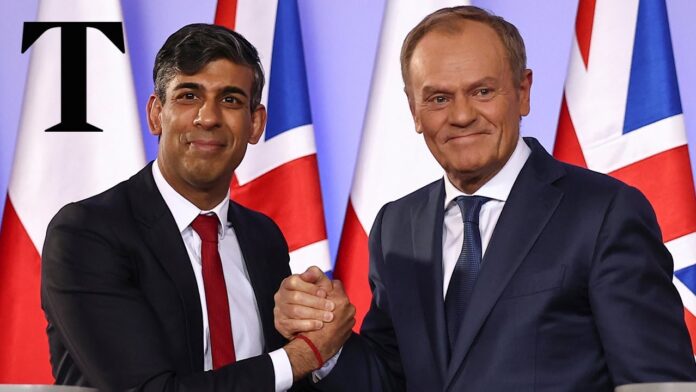Amid escalating global tensions, UK Prime Minister Rishi Sunak announces a significant boost in defence funding, setting a firm target for 2030
In a robust response to what he termed “the most dangerous international environment since the Cold War,” UK Prime Minister Rishi Sunak has pledged to increase the nation’s defence spending to 2.5% of GDP by 2030. This declaration came during his visit to Poland, underscoring the UK’s commitment to bolstering its military capabilities in the face of growing threats from an “axis of authoritarian states,” including Russia, Iran, North Korea, and China.
Addressing the media, Sunak emphasized that while the UK is not on the brink of war, the strategic increase in defence expenditure is crucial to prepare the nation’s defence industry for any potential conflicts. This move aligns with Labour’s conditional commitment to the same spending target, highlighting a rare bipartisan consensus on the matter of national security.
The planned increase will not involve expanding the UK armed forces but will support the Ministry of Defence’s ongoing projects like new frigates, a next-generation fighter jet, and modernizing the nuclear arsenal. These projects have stretched the MoD’s budget, and the additional funding is expected to alleviate financial strains.
Sunak’s announcement also includes immediate support for Ukraine, with an additional £500 million this year, affirming the UK’s ongoing commitment to Ukrainian aid as long as necessary. This decision aligns with broader international support for Ukraine amid its ongoing conflict with Russia.
The funding strategy outlined by Downing Street suggests a gradual increase in spending, which will achieve a £7 billion increase by 2030 without additional borrowing. Instead, the government plans to reallocate existing funds, including savings from a reduced civil service and shared government research budgets.
Critics, however, like Ben Wallace, former defence secretary, speculate that the increase will likely come from a “reprioritisation” of government spending, rather than new income sources. Labour’s shadow defence secretary John Healey expressed skepticism about the Conservatives’ track record on funded and sustainable defence strategies, promising a comprehensive review if Labour comes to power.
The announcement is timely as NATO urges its members to enhance their military spending in response to evolving global threats. With the UK already exceeding NATO’s baseline spending target of 2%, this new commitment could position the UK as a leading nation in defence within the alliance.
